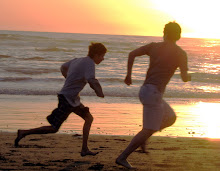I meet him in Fez. He prefers a little cafe inside the medina. He teaches Arabic Literature and film in Rabat. We talk about the Koran. I ask him about words and phrases, about the difference between haddiths. Occasionally, we talk about broad questions: what does the Koran really say about revenge? kings, women, ghosts?
"God said that if you need witnesses for a trial, you must have two men or one man and two women. Why? Because God understood that women during that time of the month of their menstrations sometimes act a little odd. They forget. If you have two, one can remind the other."
I tell my friend there are women in Berkeley who would behead him if they heard that.
We talk about one of Mohammed's disciples, Awas Ibn Malik, whose teaching, my friend says, is the basis of the Sunni faith in Morocco. "Why? He's the easiest." Compared to say, Wahhabists, who believe that you absolutely must not pray unless you have used water to cleanse yourself. But ibn Malik was a pragmatist. For him, you can simply find a rock, not any rock, not a volcanic rock or one with holes, but a smooth stone and you put it in a corner of your house — not unlike the meteorite in the Kabaa but my friend tells me this is a coincidence, not symbolic — and you rub the stone and then rub your face and hands and the simulation is enough.
Invariably, the conversation returns to the disparity between rich and poor in Morocco. This is the real topic. The Koran is warm-up, two laps around the field. He shakes his head at the way the teachers are treated in local schools. They strike twice a week in Ifrane he tells me. They get low salaries, they're rarely paid on time; no resources for their classrooms. And who is to blame, the rich ministers and members of the assembly. Look at what they're paid; their retirement packages....
"And did you ever wonder what happened to the hospital?"
There is a brand new hospital on the edge of town, once fully equipped. It was supposed to be the seed of a medical school, but never opened. One story is that the university couldn't find enough doctors to come live in Ifrane.
"Do you believe that?" my friend asks.
I don't know what to believe anymore.
Under his smile, his deep faith, my friend seethes. Above all, he resents the rich students he must deal with at the university in Rabat. His patience is tested when he hears how the poor are treated these days.... This is the door to the most sensitive subject of all.
Once, I asked him about the royal linneage, the tie to Mohammed. He took out a piece of paper and wrote Mohammed's name. He drew several lines to suggest a family tree. Under some, he wrote, 'son'. Under others, 'daughter'. Then he crossed out each of the three sons.
"All died," he said. "No heirs. We know that."
He likes to draw diagrams.
Then, he asked me my name. He can never remember it. I told him. He wrote it down as he had written Mohammed. He wanted my children's names. I told him. "And your sons, when they have children what will be their name." Mine, I said. He was nodding all the time. "And when your daughter has children what name will they carry?" I hesitated. "Will they carry your daughter's name?" he asked. " No, I suppose not."
"Exactly," he said. Then, like a math teacher, he tapped both trees with his pen. "You see?"
There is no link, no tie, no line. "It's all a fabrication. No one who knows about Islam believes that. It's for the people, but it's not true."
"You see," he went on, "the only link, the only tie through the Koran, could be through 'good works'." And above his diagram he wrote "work" and underlined it twice. "Good works is the only possible link, " he said, leaning forward because he believes there are spies and informants everywhere and that the people are getting fed up to here again.
Mar 22, 2005
Subscribe to:
Post Comments (Atom)

No comments:
Post a Comment